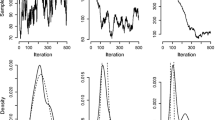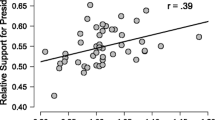Abstract
This is the sequel to my “Fifteen Arguments Against Finite Frequentism” (Erkenntnis 1997), the second half of a long paper that attacks the two main forms of frequentism about probability. Hypothetical frequentism asserts:
The probability of an attribute A in a reference class B is p
iff
the limit of the relative frequency of A’s among the B’s would be p if there were an infinite sequence of B’s.
I offer fifteen arguments against this analysis. I consider various frequentist responses, which I argue ultimately fail. I end with a positive proposal of my own, ‘hyper-hypothetical frequentism’, which I argue avoids several of the problems with hypothetical frequentism. It identifies probability with relative frequency in a hyperfinite sequence of trials. However, I argue that this account also fails, and that the prospects for frequentism are dim.
Similar content being viewed by others
Notes
Kenny Easwaran suggested that I might offer instead “Seven and a Half Dilemmas for Hypothetical Frequentism”!
Thanks here to Kenny Easwaran.
I ignore various subtleties—e.g. so called ‘finkish’ dispositions.
It only adds to the bizarreness if we add that the counterfactually repeated trials are to be ‘identically prepared’, a phrase one sometimes hears the frequentist add. Actual repeated events differ in so many ways from each other—removing all of these respects of difference takes us still further from actuality. We can countenance probabilities involving certain supernova explosions, for instance; but can we even imagine the ‘identical preparation’ of a sequence of supernova explosions—let alone an infinite sequence of them? In fact, if the identity of indiscernibles is a necessary truth, then such identical preparation may be downright impossible.
Thanks here to Darren Bradley.
Jeffrey wrote before Pluto arguably lost its title of being a planet; and before Eris arguably gained its title.
The frequentist’s idea here is somewhat reminiscent of the supervaluational treatment of vagueness. Even though there might be no determinate fact of the matter of which hair makes the difference between baldness and non-baldness, with different ‘valuations’ disagreeing on it, it is determinately true that everyone is bald-or-not-bald, since this is true on all valuations. But as we will shortly see, the analogy to supervaluating does not go through, much as the frequentist might like it to: it is not true that the limiting relative frequency is the same in all the nearest possible worlds.
Thanks here to Kenny Easwaran.
This recalls the problems with ‘operationalism’, mentioned in my previous paper’s discussion of finite frequentism.
I thank Daniel Nolan for suggesting a version of this point to me.
Now perhaps you may reply that it is random: it is the degenerate case of a random sequence of outcomes of a coin that is guaranteed to land Heads (e.g. it is two-headed). Then let the sequence be a single tail, followed by Heads forever: THHHHH…. Or the sequence TH THH THHH THHHH THHHHH, in which a single tail is always followed by ever lengthening sequences of Heads. These sequences are also non-random, yet they are still collectives.
Thanks to Kenny Easwaran and Aidan Lyon for suggesting versions of this reply.
I thank Aidan Lyon for suggesting this name.
There are many people to thank for discussions of this material over its many years of gestation. My younger self thanks especially Fiona Cowie, Peter Gerdes, Ned Hall, David Hilbert, Carl Hoefer, Richard Jeffrey, Marc Lange, David Lewis, Daniel Nolan, Brian Skyrms, Bas van Fraassen, Jim Woodward, and Lyle Zynda. My current self thanks especially Paul Bartha, Darren Bradley, Kenny Easwaran, Branden Fitelson, Aidan Lyon, Ralph Miles, and Daniel Nolan.
References
Bartha, P., & Hitchcock, C. (1999). The shooting-room paradox and conditionalizing on ‘measurably challenged’ sets. Synthese, 118, 403–437. doi:10.1023/A:1005100407551.
Carnap, R. (1950). Logical foundations of probability. Chicago: University of Chicago Press.
Church, A. (1940). On the concept of a random sequence. Bulletin of the American Mathematical Society, 46, 130–135. doi:10.1090/S0002-9904-1940-07154-X.
Costantini, D., & Galavotti, M. (Eds.). (1997). Probability, dynamics and causality–essays in honor of R. C. Jeffrey, Dordrecht: Kluwer.
de Finetti, B. (1972). Probability, induction and statistics. London: John Wiley & Sons.
Elga, A. (2004). Infinitesimal chances and the laws of nature. Australasian Journal of Philosophy, 82, (March), 67–76. (Reprinted from Lewisian themes: The philosophy of David K. Lewis, by F. Jackson, G. Priest (Eds.), 2004, Oxford: Oxford University Press.)
Hájek, A. (1997). ‘Mises Redux’—Redux: Fifteen arguments against finite frequentism, Erkenntnis 45, 209–227. (Reprinted from Costantini and Galavotti (1997). Reprint forthcoming in Philosophy of probability: Contemporary readings, by A. Eagle (Ed.), 2009, Routledge.)
Hájek, A. (2003). What conditional probability could not be. Synthese, 137(3), 273–323. doi:10.1023/B:SYNT.0000004904.91112.16.
Howson, C., & Urbach, P. (1993). Scientific reasoning: The Bayesian approach (2nd ed.). La Salle: Open Court.
Jeffrey, R. (1992). Mises Redux. In Probability and the art of judgment. Cambridge: Cambridge University Press.
Johnson, R. A. (1994). Miller & Freund’s probability & statistics for engineers (5th ed.). New Jersey: Prentice Hall.
Kripke, S. A. (1980). Wittgenstein on rules and private language. Cambridge, MA: Harvard University Press.
Lewis, D. (1973). Counterfactuals. Oxford/Cambridge, MA: Blackwell/Harvard University Press.
Lewis, D. (1980). A subjectivist's guide to objective chance. In Richard C. Jeffrey (Ed.), Studies in inductive logic and probability (Vol. 2, pp. 263–293). Berkeley and Los Angeles: University of California Press. (Reprinted in Lewis (1986)).
Lewis, D. (1986). Philosophical papers (Vol. 2). Oxford: Oxford University Press.
Lewis, D. (1994). Humean supervenience debugged. Mind, 103, 473–490. doi:10.1093/mind/103.412.473.
Lindstrom, T. (1989). An invitation to nonstandard analysis. In N. J. Cutland (Ed.), Nonstandard analysis and its applications (pp. 1–105). Cambridge: Cambridge University Press.
McGee, V. (1994). Learning the impossible. In Ellery Eells & Brian Skyrms (Eds.), Probability and conditionals. Cambridge: Cambridge University Press.
Reichenbach, H. (1949). The theory of probability. Berkeley: University of California Press.
Seidenfeld, T., Schervish, M. J., & Kadane, J. B. (1998). Non-conglomerability for finite-valued, finitely additive probability. Sankhya Series A, 60(3), 476–491.
Skyrms, B. (1980). Causal necessity. New Haven: Yale University Press.
Stalnaker, R. (1968). A Theory of Conditionals. Studies in logical theory, American philosophical quarterly monograph series (Vol. 2). Oxford: Blackwell.
van Fraassen, B. (1980). The scientific image. Oxford: Clarendon Press.
von Mises, R. (1957). Probability, statistics and truth, revised English edition. New York: Macmillan.
Author information
Authors and Affiliations
Corresponding author
Rights and permissions
About this article
Cite this article
Hájek, A. Fifteen Arguments Against Hypothetical Frequentism. Erkenn 70, 211–235 (2009). https://doi.org/10.1007/s10670-009-9154-1
Received:
Accepted:
Published:
Issue Date:
DOI: https://doi.org/10.1007/s10670-009-9154-1




